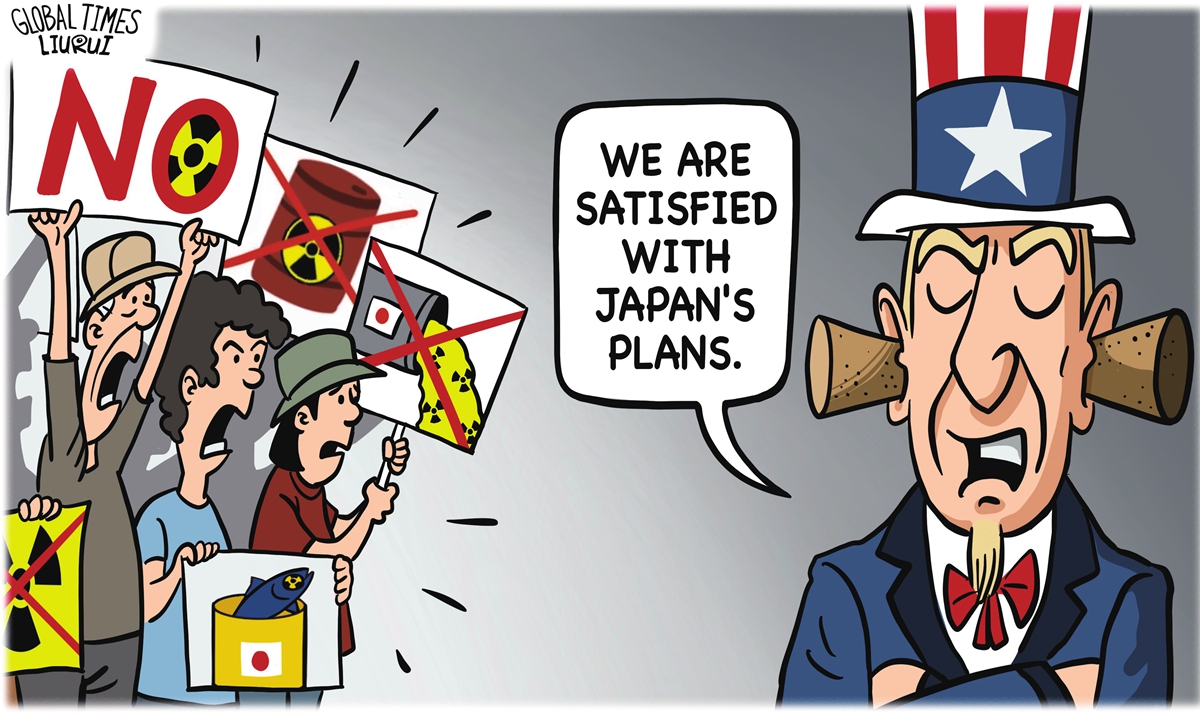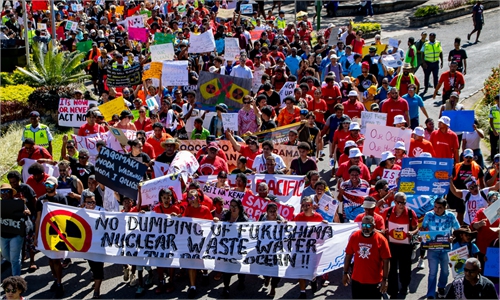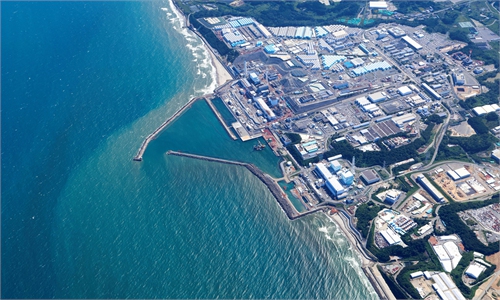US ‘satisfied’ with Japan’s dumping nuclear-contaminated water betrays its image as global leader in environment protection: observers

Illustration: Liu Rui/GT
Defying mounting opposition and contrary to its self-styled image as a global leader in environment protection, the US Department of State endorsed Tokyo's controversial dumping of nuclear-contaminated water into the ocean, saying the US is "satisfied with Japan's safe, transparent, and science-based process."
Endorsing Japan's selfish and irresponsible practice that harms world environment and health of human beings in the planet, the US trampled on its own image as a leader in global environment protection, exposing its selfishness and hypocrisy of prioritizing its geopolitical interests above the long-term well-being of the people around the world, observers reached by the Global Times said.
As the US publicly backs the Japanese government's plan to dump contaminated water into the ocean, media reports quoting data from Ministry of Agriculture, Forestry and Fisheries of Japan revealed that the US was making the biggest moves in decreasing imports of agricultural and aquatic products from Japan in the first half of 2023.
Data showed that the US is the country that reduced the imports of Japanese agriculture, forestry and fisheries the most in the first half of the year, and the main production areas of the three kinds of food are all in the affected areas of the dumping of nuclear contaminated water, according to media reports.
In an apparent political gesture, US Ambassador to Japan Rahm Emanuel claimed to eat fish from Fukushima to show support for Tokyo's decision during his visit to the region on August 31.
Though being well-aware of the risks brought by the nuclear-contaminated water to surrounding oceans and the entire global environment, the US has succumbed to its political interests and is going against its image portrayed as a leading role for environment protection activist, Lü Chao, an expert on Korean Peninsula issues at the Liaoning Academy of Social Sciences, told the Global Times on Saturday.
"It is hilarious to see the hypocrisy and double standards held by the US by covering up Japan's extremely selfish and irresponsible wrongdoing," Lü said.
"Acts and deeds from the US show that it purely considers Japan's act of harming global environment and human beings of all countries from a geopolitical perspective. The US's real intention is to tie Japan to its chariot of geopolitical games," Li Haidong, a professor at the China Foreign Affairs University, told the Global Times on Saturday.
Without the indulgence of the US, the Japanese decision on dumping of nuclear-polluted water would not have been so arbitrary. Japan opened a Pandora's box on Thursday with the strong backing of the US, allowing crisis to plague other countries and the international community, Li added.
Amid wide opposition and outcry from the Chinese public that the contaminated-water would eventually pose health risks to products from Japan, the Japanese Embassy in China issued a statement on the Japanese edition page on Friday, reminding Japanese staying in China of being careful not to speak Japanese loudly outside their homes as the possibility of encountering accidents cannot be ruled out.
The reminder triggered strong backlash among Chinese netizens late Friday, with many saying "it is the Japanese government we are opposing not the Japanese people" and some accused Japanese government of attempting to divert attention from being targeted due to its insistence on dumping contaminated water.
Lü told the Global Times Tokyo's hype over the safety of Japanese nationals in China servers its purpose of packaging itself as a victim caught in a cycle of deteriorating China-Japan ties and isolating China in its foreign policy while catering to the US' Asia-Pacific strategy to counter China.
Japanese farm minister Tetsuro Nomura on Friday even expressed his surprise that China was taking the responsive measures by suspending imports of aquatic products from Japan, Mainichi Shimbun reported, saying he was "very surprised and completely unexpected."
Chinese Ambassador to Japan Wu Jianghao had said China's decision to suspend imports of aquatic products from Japan is reasonable and necessary. The responsibility for this situation lies entirely with Japan, and Japan should reflect on its own actions, Ambassador Wu said.
Japan's actions have provoked strong opposition in China, protest against its dumping the contaminated water into the sea has been mounted in South Korea, with lawmakers of the Democratic Party and the Justice Party planning to visit Fukushima from Sunday and Monday, according to the National Assembly on Thursday.



